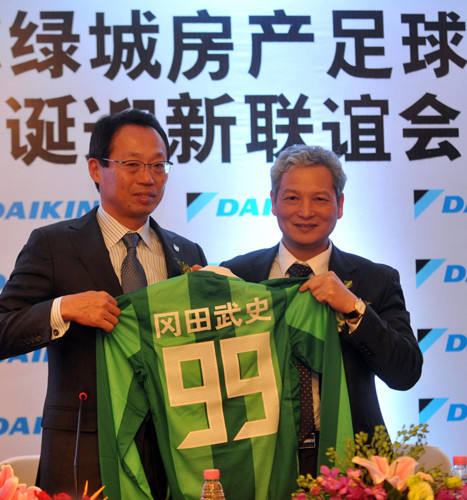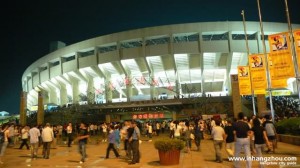Are this Year’s “Green Samurais” the 2012 Chinese Super League Dark Horse?
Shaking off 2011
The 2011 year became an unnerving saga for Hangzhou Greentown fans, most notably because home matches were bizarrely alternated between Jiaxing and Yiwu (another…Only in the Chinese Super League). Jiaxing and Yiwu, 50Km south and 60 km Northeast, respectively, of the fan base, provincial capital, and namesake cityHangzhou, was a major inconvenience. Still, after qualifying for the Asian Champions League in the 2010 season and retaining much of the same player contingent, expectations were high on the Zhejiang Province club. A bright first few matches in 2011 saw them on top of their ACL group and Chinese Super League, but fortunes quickly turned to mediocrity as the team bowed out of Asian competition in the first round and became a steady fixture at the middle of the table. Worse yet, towards the end of the season there were rumors leaked about the clubs parent company’s, Greentown Real-estate Holdings, ability to support the club and even reported offers to relocate as far away as Hainan.
Return of the (Yellow) Dragon
Rest assured, HuangLong (Yellow Dragon) stadium the previous and largest venue in Hangzhou has been restored to host all 2011 Hangzhou Greentown Chinese Super League matches. This alone provides encouragement to the club, that despite financial difficulty (demonstrated in minimal player investment), is committed to being a solely Hangzhounese franchise. Attendance for home matches is likely to double, providing motivation for players and fans, but there is a new ‘cultural risk’ management has taken in changing the 2010 team.
The Okada Factor
In a surprise move, Hangzhou Greentown appointed Takeshi Okada as manager for the 2012 season. His stellar reputation and recent success inAsia and internationally qualifies him as an outstanding candidate for any Chinese Super League managerial position. Most notably, Okada took the Japanese National team to an impressive round of16 inthe 2010 FIFA world cup, losing only toParaguayon penalties, and demonstrating several dazzling performances of a new, skillful brand of Japanese soccer. Nevertheless he is the first Japanese coach, or any high profile Japanese football individual, to undergo the spotlight of the Chinese Super League. Still, iuf Okada can bring the same success toHangzhouthere is no reason he will quickly gain support and be an effective ambassador to the sport.
Who be the newbies?
Okada’s biggest challenge will be implementing a somewhat modest exchange in the transfer market. The biggest asset acquired is Korean defender Kim Dong-Jing, with international experience in the Asian Champions League, two seasons in Russia with Zenit St.Petersburg, and 62 caps with South Korea, Kim and captain Du Wei will be counted on as defensive stalwarts. Alongside Kim is compatriot Jeong Dong-Ho, who, on loan from F.C. Yokohama Marinos inJapan, could be a communicative and cultural move as much as a tactical one. Then there is a new contingent of Brazilians (Renatinho, Fabricio, and Mazola), all young (24, 21, and 22, respectively) and untested in the Chinese Super League, but Renatinho and Mazola have each played in the J League, which could ease their adaptation to China and the Chinese Super League. Still, has a whole column on “Only in the Chinese Super League” for the leagues ability to go beyond expectation of the ridiculous.
Asian Champions League Target
With 5 new foreign players, and a new foreign coaching staff, there is both hope and speculation towards Hangzhou Greentown’s 2012 campaign. Losing all the preseason matches in Japanwas not encouraging, but this team will need time to mold into consistent performances. As an optimist I’m leaning on Okada to establish a legacy of disciplined and crafted soccer in Hangzhou, and when the “Green Samurais” qualify for the Asian Champions League, at least one person will not be surprised.



